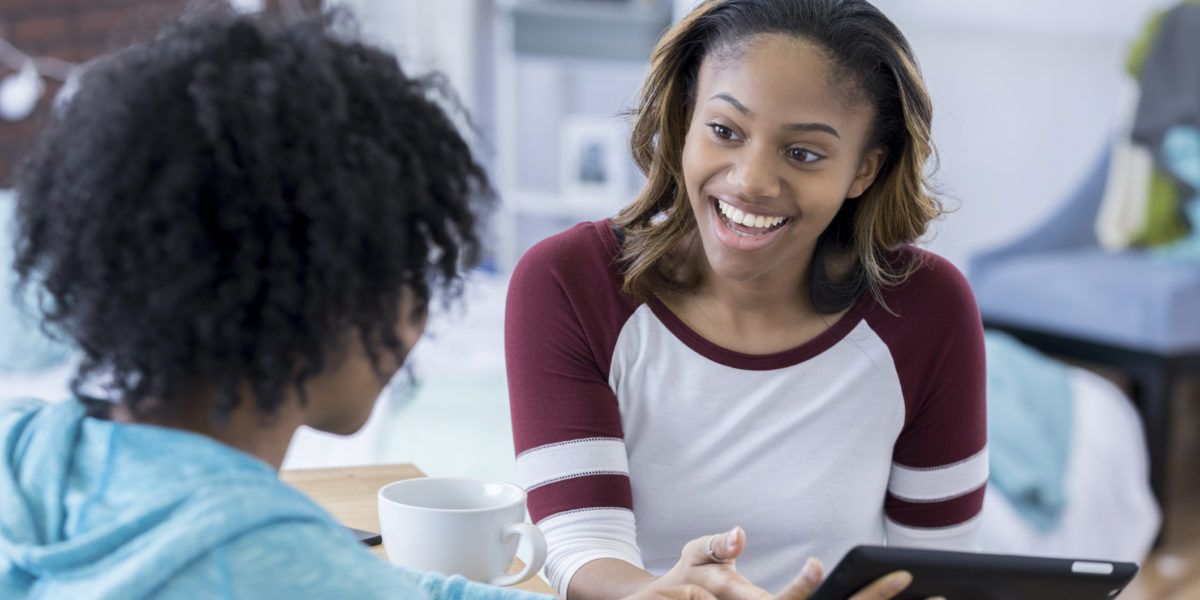This is a tough time for everyone, but it may be especially hard on teens. You may be missing important experiences, like playing sports. Some teens will miss summer jobs or college visits. Most of all, you’re probably missing your friends. Here are some questions teens have been asking.
Can I hang out with my friends?
Not in your usual ways. Depending on health restrictions where you live, hanging out in person, parties, sleepovers, and team sports may be out right now. But staying connected with your friends is really important. So call or text them. Have virtual hangouts or group chats to play games or stream movies. And remember, this won’t last forever.
Bored? Check out 14 Ways to Combat ‘Cabin Fever’ During COVID-19
Why do I need to stay home?
Staying home helps protect you and the people you care about from COVID-19. This virus spreads easily from person to person. And people can spread the virus before they have any symptoms. Some never even get sick, but they can still infect other people. So the safest thing to do is stay home until your local authorities say it’s okay to end social distancing.
I’m so bored. What can I do?
Lots of teens say the main thing they feel is bored. And that can lead to habits like sleeping late, random snacking, and spending a lot of time online or gaming. To fight the boredom:
- Structure your day. You’ll probably feel better if you have a regular routine.
- Try to go to bed and get up about the same time every day.
- Set a time for schoolwork, meals, and chores. Fit in some activity and downtime too.
- Try something new. Look at this as a chance to do something you never had time for in the past. For example, look for free online classes and try a new hobby. Maybe there’s a musical instrument in a closet that you could learn to play. Start a social media page about your pet. Take a virtual tour of a place you’d like to visit one day. Download a book you’ve heard was good. Or start writing your own book.
- Do something active. Get your body moving. Have a virtual dance party with friends. Take an online yoga class. Find an online boot camp workout. Or get out an old hula hoop or jump rope and try it.
Is it okay to go outside?
It’s healthy to get out for some exercise. You can do active things on your own, like take a walk or a bike ride or go for a run. You can do things outdoors with the people you live with. But you need to avoid contact with other people as much as you can.
If you really need to go to a store or other public place:
- Keep your distance from other people—at least six feet.
- Wear a cloth face cover, like a homemade face mask or a bandanna. And make sure that you don’t touch your face.
- Wash your hands well as soon as you get home. That means with soap and water for at least 20 seconds. Then rinse and dry well.
I’m stressed out. What can I do?
- Talk to someone who cares about you, like a close friend or loving adult. Sharing how you feel can be a good way to relieve stress. And they may have ideas that could help you feel better.
- If you’re struggling with feeling sad, depressed, or anxious, you may need more help. Many therapists can do counseling by phone or online. Or you could look for an online support group. Or call the Disaster Distress Helpline at 1-800-985-5990, or text TalkWithUs to 66746.
- If you or someone you know talks about suicide, self harm, or feeling hopeless, get help right away. Call the National Suicide Prevention Lifeline at 1-800-273-TALK
(1-800-273-8255), or text HOME to 741741 to access the Crisis Text Line. Consider saving these numbers in your phone. - Home is not a safe place for everyone. If it’s not safe for you to stay at home, call or text the Childhelp National Child Abuse Hotline at 1-800-4-A-CHILD (1-800-422-4453). Help is available 24/7.
How can I help other people?
There are lots of ways you can be helpful, starting with the people in your own home. Here are some ideas:
- Help them connect with others. You’re probably better with digital devices than most adults. Maybe you could show those in your household how to use an app like Skype or WhatsApp
so they can stay in touch with friends and family. - Take on some extra chores. Maybe you could make a meal, do cleaning or laundry, or take care of younger siblings or pets. Or you could do errands, like shopping for groceries or
picking up medicines. - Check on older relatives. A call from you could mean a lot to a grandparent, aunt or uncle.
- Be patient. Your family or others you live with may be driving you crazy, but remember that this is a rough time for them too. Cut them some slack. And don’t be too hard on yourself either.
- You can also help your community. For example, schools and food banks may need people to collect canned foods. Look online for nonprofits in your area that need volunteers.
Learn more about coronavirus COVID-19 here.



